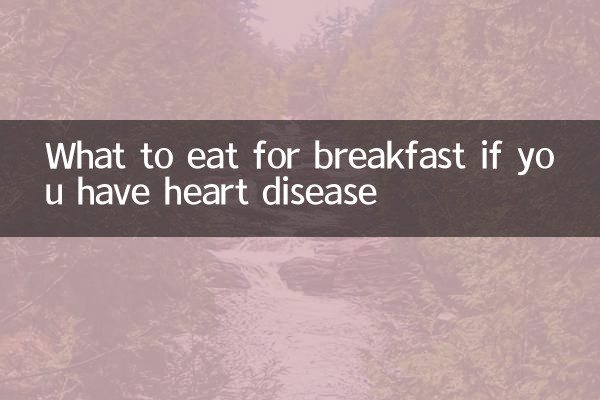What to eat for breakfast with heart disease: scientific combination helps heart health
In recent years, heart disease has become one of the major health threats worldwide. A reasonable breakfast mix is particularly important for patients with heart disease. It can not only provide necessary nutrients, but also help control the disease. This article will combine the popular health topics on the Internet in the past 10 days to recommend scientific breakfast options for heart disease patients.
1. The importance of breakfast for patients with heart disease

Breakfast is the most important meal of the day, especially for heart patients. Research shows that a proper breakfast can help stabilize blood sugar, lower cholesterol levels, and reduce the risk of cardiovascular disease. Here are three principles for breakfast for heart disease patients:
1.Low salt and low fat: Reduce sodium and saturated fat intake to avoid increasing the burden on the heart.
2.High fiber: Increase dietary fiber intake to help lower cholesterol.
3.Balanced nutrition: Ensure balanced intake of protein, vitamins and minerals.
2. List of recommended breakfast foods for heart disease patients
| food category | Recommended food | health benefits |
|---|---|---|
| Cereals | Oats, whole wheat bread, brown rice | Rich in dietary fiber, lowers cholesterol |
| protein | Eggs (boiled), low-fat milk, tofu | High-quality protein, does not increase the burden on the heart |
| Fruits | Banana, apple, blueberry | Rich in potassium and antioxidants, protects cardiovascular |
| Vegetables | spinach, broccoli, carrots | Rich in vitamins and minerals to promote heart health |
| Nuts | Almonds and walnuts (appropriate amount) | Healthy fats to improve blood lipid levels |
3. Breakfast foods that heart disease patients should avoid
| food category | Foods to avoid | Potential hazards |
|---|---|---|
| High salt food | Pickles, bacon, sausages | Increase blood pressure and increase heart burden |
| high fat food | Fried foods, cream cakes | Increase cholesterol and promote arteriosclerosis |
| High sugar foods | Sweet drinks, candies, white bread | Cause blood sugar fluctuations and increase cardiovascular risk |
| processed food | Instant noodles, canned food | Contains a lot of additives that are not good for heart health |
4. Recommended weekly breakfast plan for heart disease patients
| week | Breakfast pairing | Nutritional Highlights |
|---|---|---|
| Monday | Oatmeal + boiled eggs + apples | High fiber, high quality protein, antioxidant |
| Tuesday | Whole wheat bread + low fat milk + banana | Low GI, potassium supplement, calcium supplement |
| wednesday | Brown rice porridge + stir-fried spinach + walnuts | Complex carbs, iron, healthy fats |
| Thursday | Tofu curd + whole wheat steamed bun + blueberry | Plant protein, low fat, antioxidant |
| Friday | Sweet potato + boiled egg + broccoli | Dietary fiber, vitamin C, folic acid |
| Saturday | Multigrain porridge + cold carrots + almonds | Various grains, beta-carotene, vitamin E |
| Sunday | Low-fat yogurt + whole wheat bread + kiwi fruit | Probiotics, vitamin C, easy to digest |
5. Tips for cooking breakfast for heart disease
1.Cook with less oil: Try to use cooking methods such as steaming, boiling, and stewing to reduce the use of fat.
2.Control salt: Use spices and herbs such as garlic, ginger, rosemary, etc. instead of some salt.
3.Fresh ingredients: Choose fresh seasonal ingredients and avoid processed foods.
4.Eat in moderation: Breakfast should not be too full, but should be about half full.
5.Timing and quantitative: Develop regular dining habits to help stabilize metabolism.
6. Common misunderstandings about breakfast for heart disease
1.Myth 1: Skipping breakfast can help you lose weight: Research shows that skipping breakfast increases the risk of obesity and heart disease.
2.Myth 2: All grains are the same: Refined grains lack dietary fiber, so choose whole grains.
3.Myth 3: The more nuts you eat, the better: Although nuts are healthy, they are high in calories. A small handful a day is enough.
4.Myth 4: Sugar-free food is healthy food: Many sugar-free foods still contain high amounts of unhealthy fats.
7. Conclusion
A reasonable breakfast mix is an important part of the daily management of heart disease patients. By choosing low-salt, low-fat, high-fiber, nutritionally balanced foods and avoiding unhealthy eating habits, you can effectively reduce the risk of cardiovascular disease. It is recommended that patients with heart disease develop a personalized breakfast plan under the guidance of a doctor or nutritionist to lay a solid foundation for heart health.
Remember, a healthy breakfast habit requires long-term persistence, coupled with appropriate exercise and a good lifestyle, to better protect heart health. Starting tomorrow, prepare yourself a heart-healthy breakfast!

check the details

check the details